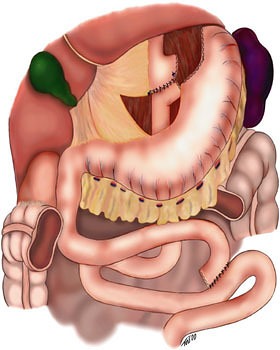Common types of weight loss surgeries

- Roux-en-Y (ROO-en-WEYE) gastric bypass. The surgeon uses surgical staples to create a small stomach pouch. This limits the amount of food you can eat. The pouch is attached to the middle part of the small intestine. Food bypasses the upper part of the small intestine and stomach, reducing the amount of calories and nutrients your body absorbs.
- Laparoscopic (LAP-uh-ruh-SKAWP-ik) gastric banding. A band is placed around the upper stomach to create a small pouch and narrow passage into the rest of the stomach. This limits the amount of food you can eat. The size of the band can be adjusted. A surgeon can remove the band if needed.
- Biliopancreatic (bil-ee-oh-pan-kree-at-ik) diversion (BPD) or BPD with duodenal (doo-AW-duh-nul) switch (BPD/DS). In BPD, a large part of the stomach is removed, leaving a small pouch. The pouch is connected to the last part of the small intestine, bypassing other parts of the small intestine. In BPD/DS, less of the stomach and small intestine are removed. This surgery reduces the amount of food you can eat and the amount of calories and nutrients your body absorbs from food. This surgery is used less often than other types of surgery because of the high risk of malnutrition.
If you are thinking about weight-loss surgery, talk with your doctor about changes you will need to make after the surgery. You will need to:
- Follow your doctor’s directions as you heal
- Make lasting changes in the way you eat
- Follow a healthy eating plan and be physically active
- Take vitamins and minerals if needed
You should also talk to your doctor about risks and side effects of weight loss surgery. Side effects may include:
- Infection
- Leaking from staples
- Hernia
- Blood clots in the leg veins that travel to your lungs (pulmonary embolism)
- Dumping syndrome, in which food moves from your stomach to your intestines too quickly
- Not getting enough vitamins and minerals from food
Is liposuction a treatment for obesity?
Liposuction (LY-poh-suhk-shuhn) is not a treatment for obesity. In this procedure, a surgeon removes fat from under the skin. Liposuction can be used to reshape parts of your body. But this surgery does not promise lasting weight loss.
Image Courtesy of Ethicon Endosurgery, Inc., used with permission. Author: Ethicon Endosurgery, Inc.